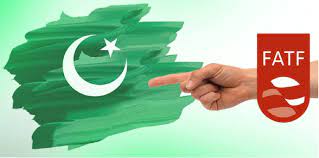Islamabad June 17 2022: Now, once again, the time has come for the year when, based on Pakistan’s performance, it will be decided at the plenary meeting of the Financial Action Task Force (FATF) to remove it from the gray list or keep it further.
This time, Minister of State for Foreign Affairs Hina Rabbani Khar, who chairs the coordination committee of Pakistan’s Financial Action Task Force, is leading the Pakistani delegation in Berlin, Germany. He has met with current and former FATF representatives and leaders.
The FATF is hosting this plenary meeting in Berlin this time, which will run from 13 June to 17 June (ie today).
The plenary session will discuss Pakistan’s performance in 2018 and 2021 and review these measures, while the plenary session will also review the recommendations of the International Cooperation Review Group (ICRG).
It should be noted that in the year 2018, Pakistan was made a part of the FATF gray list, after which the number of countries investing in Pakistan had decreased slightly.
In a review in March 2022, the terrorist financing agency left Pakistan on the gray list, saying that Pakistan had “made significant progress in fulfilling its recommendations.”
Pakistan has so far completed 26 of the 27 recommendations made by the FATF in 2018, and seven of the seven points made by the Asia Pacific Group (APG), a sub-branch of the FATF, in 2021. Has completed six ahead of time.
The two remaining recommendations include legal action against terrorist organizations and stricter measures against money laundering.
It should be noted that Pakistan had also amended the law against money laundering in the year 2020 so that further action could be taken but according to the spokesperson of the federal government, in the review of 2021, He was asked to provide further examples of progress in action and money laundering cases.
Government spokesmen are looking forward to a slightly better review this year than last.
A spokesman for Pakistan’s current federal government told the BBC that reports so far suggest that this time the issue would be in Pakistan’s favor, but that even if Pakistan was removed from the gray list It will take time and it may take seven to eight months.
Citing an example, he said that in case of exit from the gray list, the FATF team would visit Pakistan to assure itself that work on their recommendations had been completed.
The spokesman said the two recommendations left to the FATF team include amendments to the law as well as concerns about its implementation, which they have expressed several times.
Dr Khaqan Najeeb, a former adviser to the finance ministry, told the BBC that Pakistan had complied with most of the recommendations but had not yet succeeded in removing itself from the gray list altogether.
“If Pakistan gets out of the gray list this time, it would be a good thing to finally get out of so many years of monitoring. It will be a positive thing for investors and the world that they will be able to invest in Pakistan.
He said that opportunities for trade and foreign investment would also be created.
However, a spokesman for the federal government said that “although the situation seems to be moving in Pakistan’s favor, it is important to keep in mind that there are other countries in this meeting whose consent and consolation are also significant.”
One of the reasons for this is the statement of former foreign minister Shah Mehmood Qureshi in which he accused Pakistan’s neighbor India. Former Foreign Minister Shah Mehmood had said that India wanted to use the FATF forum for “political purposes”.
The former foreign minister also said that the FATF was “a technical forum that should not be used to deal with political issues.”
The Asia-Pacific Group, which reviewed money laundering in March this year and earlier in 2021, added Pakistan to its watch list in its second follow-up report, but continued to encourage Pakistan from time to time. Is.
The agency has convinced Pakistan that only through anti-money laundering and anti-terrorist legislation can Pakistan be removed from the gray list.
According to a 2021 report, the agency had urged Pakistan in its February 2021 meeting to implement three key recommendations, including punishing terrorists, prosecuting them and restricting financial assistance.
One of the points left in all these recommendations was that the FATF also called for legislation against terrorists and an investigation into the financing they receive.
In this regard, the organization has been asking Pakistan for proof of the legal application of the ban on financing terrorists.










